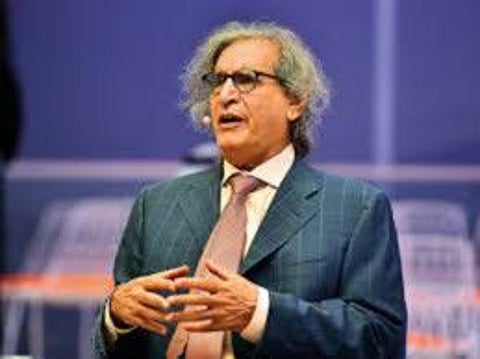Saudi Arabia’s ‘Okaz’, a 60-year-young newspaper
Legedary Saudi journalist reminisces the story of the Arabic version of ‘New York Post’

Abu Dhabi: Having worked as a journalist for more than 50 years, Othman Al Omeir is certainly not short of stories.
The list of his interview subjects, as the editor of several Arabic newspapers and founder of Elaph.com, is a who’s who of the modern age. He has quizzed everyone — from Mikhail Gorbachev to George Bush Senior, from Margaret Thatcher to John Major.
So, when such a legendary mediaperson reminisces about the story of the venerable Saudi newspaper Okaz, which was launched in 1960, it is worth taking note.
Okaz is simultaneously printed from Riyadh and Jeddah and has offices all over Saudi Arabia. However, the daily mainly serves the provinces of Hejaz and Asir.
Okaz was established in Jeddah in 1960 by Ahmed Abdul Ghafoor Attar and is one of the oldest newspapers in Saudi Arabia.
“I used to take from the piggy bank and then quickly rush to a bookshop on Al Ayina Street, Diyaa, in Madinah, Saudi Arabia. It belonged to a gloomy man who used to always scold everyone, except me, the Najdi coming from Zulfi, with a sharp instinct and a faltering urban dialect,” says Al Omeir, who was born in 1950 in Riyadh. He began his career in journalism as a teenager more than 50 years ago.
“The bookshop owner was surprised at my persistence to know his store. The city then was one of the most beautiful places on the face of the globe: Its lavish markets, its people with varied languages and dialects, its high minarets and its lofty antiquities, its bay oozing elegance. It was historically lavish and unspoilt by humans.
“There I read Okaz. At that time, the Kingdom was witnessing a significant press renaissance.
Adding to a synthesis
“Hassan Abdul Qazaz’s Blad newspaper was competing with Okaz owned by Ahmed Abdel Ghafour Attar, and between them, the Al Madinah weekly, of Ali and Othman Hafiz, and the Al Raed weekly, published every Monday by Professor Abdel Fattah Abu Madian, fought for prominence.
“There was Al Manhal, by Abdul Quddus Al Ansari, and Quraish, by Ahmed Al Sibai. As for Riyadh, Yamamah and Al Jazeera were published weekly, and so was Al Qassim. Dhahran, the base of the region, had a surfeit of newspapers and magazines.”
Al Omeir added that this synthesis was the beginning of the emergence and development of Saudi newspapers. It could have jumped and expanded, but the fear of lawlessness and pluralism sprouted in the minds of media officials at the time, even as the idea of press institutions had its pros and cons.”
He added that in Madinah, due to limited means of transportation, only publications published from Hejaz were sold. Thereafter, the larger names shone, that later became the buzz in Saudi media.
‘Fixing linguistic flaws’
“I first knew Okaz through the great writer Ahmed Abdel Ghafour Attar and the nicest thing is that I knew him through the book of the Sahhah, a multi-volume Arabic thesaurus. I found it in the library at home, but did not care about it. However, I was interested in the Saudi author, who, for the first time, had co-authored the book with an Egyptian writer. Of course I did not understand the book. Or else, I would have fixed some of my linguistic flaws,” Al Omeir said.
Lawrence Wright of the New Yorker states that Okaz was “like an Arabic version” of the New York Post.
According to Al Omeir, the Okaz newspaper helped direct people’s interest towards news and investigative reporting, even if that was only timid.
“My point is that the phenomenon of Abdullah Omar Khayyat is not a passing one in the history of Saudi press. In his time, the Okaz newspaper he was editing began to pay attention to young talents and modern newspaper layouts. It presented news from outside the homeland, in addition to presenting itself as a major local newspaper.
“And since Ahmed Obaid founded a magazine called Riyadh and had an exclusive interview with His Highness Prince Fahd, the then minister of Education, press largely remained silent for 20 years until Abdullah Khayat surprised readers with an extensive interview with Prince Fahd, who became a second deputy to the Cabinet and minister of Interior, in addition to becoming a potential candidate for the throne.
Decades of initiatives
“Then came the duo of Ali Shobokshi and Reda Larry, who catapulted the Okaz newspaper to the realm of interviews, taking advantage of their experience and extensive relationships.
At present, Al Omeir says, Sheikh Abdullah Saleh Kamel has emerged out of an integrated media school founded by his father, who passed away recently after decades of media initiatives, and he is leading the Okaz’s drive towards absorbing all the new developments in terms of innovation and seizing the opportunities to develop a robust press.
Sign up for the Daily Briefing
Get the latest news and updates straight to your inbox







